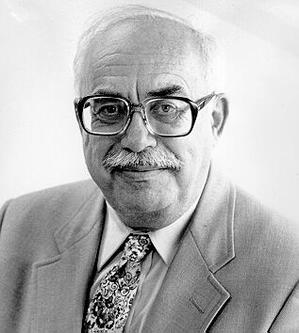Stanford J. Shaw facts for kids
Quick facts for kids
Stanford J. Shaw
|
|
|---|---|

Stanford J. Shaw
|
|
| Born |
Stanford Jay Shaw
5 May 1930 St. Paul, Minnesota, U.S.
|
| Died | 16 December 2006 (aged 76) Ankara, Turkey
|
| Alma mater | Princeton University |
| Scientific career | |
| Fields | Ottoman history |
| Institutions | UCLA Bilkent University |
| Doctoral students | Heath Ward Lowry · Justin McCarthy |
Stanford Jay Shaw (5 May 1930 – 16 December 2006) was an American historian, best known for his works on the late Ottoman Empire, Turkish Jews, and the early Turkish Republic. Shaw's works have been criticized for their lack of factual accuracy as well as denial of the Armenian genocide, and other pro-Turkish bias, by some historians.
Biography
Stanford Jay Shaw was born to Belle and Albert Shaw, who had immigrated to St. Paul from England and Russia respectively in the early years of the twentieth century. He was of Jewish heritage. Stanford Shaw and his parents moved to Los Angeles, California, in 1933 because of his father's illness, and they lived there until 1939, first in Hollywood, where Stanford went to kindergarten, and then in Ocean Park, a community on the shore of the Pacific Ocean between Santa Monica and Venice, where his parents operated a photographic shop on the Ocean Park pier.
The family returned to St. Paul in 1939, where Stanford went to the Webster Elementary School. After his parents divorced, Stanford went with his mother to Akron, Ohio during World War II, where he went to elementary school. Stanford and his mother remained there until she married Irving Jaffey and moved back to St. Paul. Stanford then attended Mechanic Arts High School in St. Paul, where he graduated in 1947, one out of only five students from a student body of 500 who went to college.
Education and early research
He went on to Stanford University, where he majored in British history under the direction of Professor Carl Brand, with a minor in Near Eastern history, under the direction of Professor Wayne Vucinich. He received his B.A. at Stanford in 1951 and M.A. in 1952, with a thesis on the foreign policy of the British Labour Party from 1920–1938, based on research in the Hoover Institution at Stanford.
He then studied Middle Eastern history along with Arabic, Turkish and Persian as a graduate student at Princeton University starting in 1952, receiving his M.A. in 1955. Subsequently he went to England to study with Bernard Lewis and Paul Wittek at the School of Oriental and African Studies, University of London and with Professor H. A. R. Gibb at Oxford University.
Following this, he went to Egypt to study with Shafiq Ghorbal and Adolph Grohmann at the University of Cairo and Shaikh Sayyid at the Azhar University, also doing research in the Ottoman archives of Egypt at the Citadel in Cairo for his Princeton Ph.D. dissertation concerning Ottoman rule in Egypt. Before leaving Egypt, he had a personal interview with President Gamal Abd al-Nasser, who arranged for him to take microfilms of Ottoman documents out of the country.
Main research
In 1956-7 he studied at the University of Istanbul with Professors Omer Lutfi Barkan, Mukrimin Halil Yinanc, Halil Sahillioglu, and Zeki Velidi Togan, also completing research on his dissertation in the Ottoman archives of Istanbul, where he was helped by a number of staff members, including Ziya Esrefoglu, Turgut Isiksal, Rauf Tuncay, and Attila Cetin, and in the Topkapi Palace archives, where he was provided with valuable assistance and support by its director, Hayrullah Ors and studied with Professor İsmail Hakkı Uzunçarşılı.
He received his Ph.D. degree in 1958 from Princeton University. His dissertation was titled "The Financial and Administrative Organization and Development of Ottoman Egypt, 1517–1798," which was prepared under the direction of Professor Lewis Thomas and Professor Hamilton A.R. Gibb, and later published by the Princeton University Press in 1962. Stanford Shaw served as Assistant and Associate Professor of Turkish Language and History, with tenure, in the Department of Near Eastern Languages and in the Department of History at Harvard University from 1958 until 1968, and as Professor of Turkish history at the University of California Los Angeles from 1968 until his retirement in 1992.
Last years
He was recalled to teach Turkish history at UCLA between 1992 and 1997. His final post was at Bilkent University, Ankara, as professor of Ottoman and Turkish history from 1999 to 2006.
The announcement of his death by his department at UCLA noted that his life was commemorated at Etz Ahayim Synagogue in Ortaköy, Istanbul, where his family accepted condolences from friends and colleagues and from Turkish Foreign Minister Abdullah Gül and numerous other dignitaries and that he was buried at the Ashkenazi Cemetery in Ulus.
Awards
He was an honorary member of the Turkish Historical Society (Ankara), recipient of honorary degrees from Harvard University and the Boğaziçi University (Istanbul), and a member of the Middle East Studies Association, the American Historical Society, and the Tarih Vakfi (Istanbul). He also has received Order of Merit of the Republic of Turkey from the President of Turkey and medals for lifetime achievement from the Turkish-American Association and from the Research Centre for Islamic History, Art and Culture (IRCICA) at the Yıldız Palace, Istanbul. He received two major research awards from the United States National Endowment from the Humanities as well as fellowships from the Ford Foundation, the Rockefeller Foundation, and the Fulbright-Hayes Committee. He was also a Senior Fellow of the Institute of Turkish Studies.

